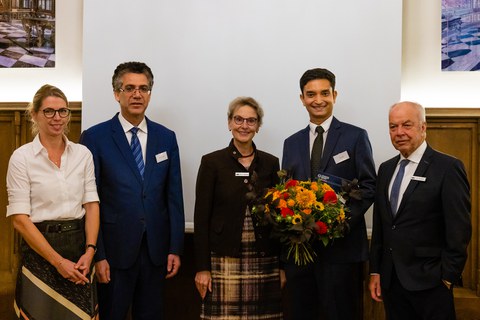Oct 15, 2021
Dr.-Ing. Moniruddoza Md. Ashir from ITM is honored for his dissertation with the Innovation Award of the Industry Club Saxony 2020

Dr. Ashir (2nd from right) at the award ceremony of the Innovation Award of the Industrieclub Sachsen 2020 together with Mrs. B. Deutsch (Managing Director Industrieclub Sachsen e.V.), Prof. Dr. Ch. Cherif (Director of ITM), Prof. U. Staudinger (Rector of TUD) and Dr. G. Bruntsch (President Industrieclub Sachsen e.V.); from left to right.
Dr.-Ing. Moniruddoza Md. Ashir from ITM was awarded the Innovation Prize of the Industry Club Saxony 2020 on October 12, 2021 for his dissertation "Development of novel textile-based adaptive fiber-reinforced composites with shape memory alloys". The prize is endowed with 5,000 EUR and is awarded annually to a graduate of the TU Dresden.
The decision to award the Innovation Prize of the Industry Club Saxony 2020 was made by a jury in the summer of 2021. The Innovation Award was presented at an event of the Saxony Industry Club at Schloss Eckberg in Dresden on October 12, 2021.
Dr. Ashir started his studies in 2011 as a DAAD scholarship holder from Bangladesh in the non-consecutive course of textile and clothing technology at ITM. He successfully completed his studies with a master's thesis on "development of hybrid fabric structures for lightweight applications". With these innovative developments, he achieved the German Textile Mechanical Engineering Promotion Award in 2014 and the ITMA Research & Innovation Excellence Award as runner-up in 2015.
In the dissertation, alternative approaches based on innovative textile-based adaptive fiber-reinforced plastic (FRP) composites with structurally integrated shape memory alloys are designed, implemented, tested and evaluated in comparison with conventional technical solutions. Therefore, a large number of previously unsolved conceptual as well as textile- and material-specific issues had to be addressed and analyzed in depth. These include the development of novel approaches and technological solutions both for the reproducible setting of a boundary layer between the shape memory alloy in wire form and the surrounding fiber composite material that meets the requirements, and for the fully automated integration of the textile-processable actuator into the reinforcement structure. Further objectives were the determination of structure-function property relationships, the demonstration of functional long-term stability as well as the conceptual design and testing of industry-relevant functional demonstrators. Here, adaptive FRPs were designed as bionically inspired flight, compliance, gripping, clamping, directed fluid control, wiping, and locomotion mechanisms. These demonstrators represent all the main functionalities of adaptive FVK kinematics and can be easily transferred to other industrial application fields, such as aircraft, automotive, medical, soft robotics, construction or industrial engineering.
The research and development work was carried out in close cooperation with industry, such as thoenes Dichtungstechnik GmbH and Elbe Flugzeugwerke GmbH, and will be intensively continued at ITM in the future. The newly developed technology and structures will give new impetus to lightweight construction, especially as nodal elements for frame structures in vehicle construction, aerospace, mechanical engineering and architecture. Currently, the application of these structures for medical areas, especially orthopedic or prosthetic aids, is being advanced on the research side.
